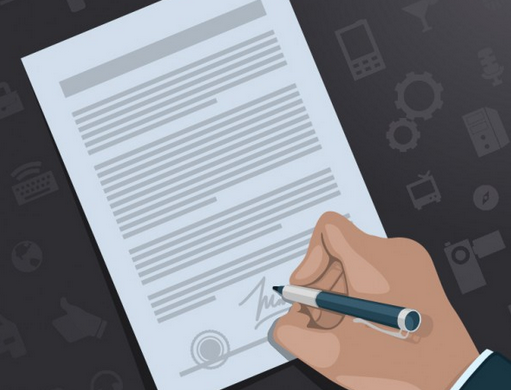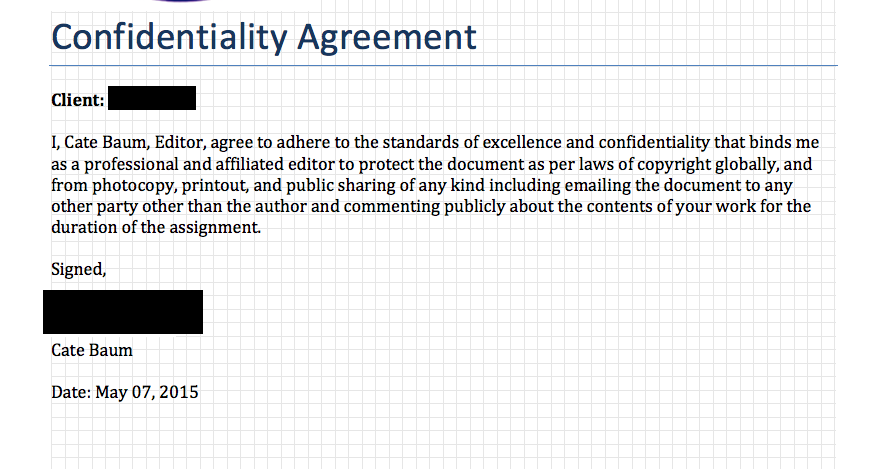
1. Amateurs are starting fires and making you paranoid
It’s a big old insult to editors everywhere. Do writers think professional editors go around stealing novels and publishing them? This is akin to the adage that says maids don’t steal. If I did this ever, I would never get another editing job, would I? Maybe another writer would plagiarize, such as when Jeffrey Archer stole a Roald Dahl story for The Guardian, but us editors have to be tight, honest, and aware of all originality. In fact, I have had the misfortune to catch an author out on 100% plagiarism twice. I read a lot, you see. I know what’s going on.
It’s insulting and incendiary sky-is-falling style blog articles such as this one from Shelley Hitz (a self-labeled ‘triple threat’ “Mom/Author/Minister) on Training Authors (Trainee Authors?), that get authors riled up in the wrong ways,
“Even if you know your editor well, I recommend having them sign a non-disclosure agreement. This protects you and your work from being shared or stolen during the editing process.”
(Read more: http://www.trainingauthors.com/non-disclosure-agreements-three-reasons-to-use-one/#ixzz3ZHmrvxA5)
If only authors worked on their book covers and content as much as they worry…
But guess what?
2. Good editors don’t have time to steal book ideas.
I work on average 12 -14 hours a day on other people’s books. I have been trying to work on my own novels for years. I don’t want yours, thanks. No offense, I have enough to do without thinking about your story. Editors have to read after work, so we can blot out all traces of your book in the works. Why? So we can keep seeing the trees for the wood.
Editing a book is not a normal way of reading. We read in a technical way. The words do not affect the brain as entertainment. We are poised on critique – every word seems sharp or blunt, misshapen or perfect. The words are being assessed in the same way a gynecologist/proctologist examines you. It’s a scientific process that takes much more energy out of us than if we were going to kick off our boots and absorb your entertaining prose. It takes up to two hours to deal with each ten to fifteen pages. Would you want your gynecologist/proctologist to be looking at you in any other way? I didn’t think so.
3. Out of Energy
If I was going to put time and energy into promoting a book, it’s going to be mine – when I have the time to write it in about 1000 years. On average, it takes $3000 and two hours a day seven days a week to promote a book. Or, I can edit a couple of books and earn good, secure money doing what I love.
4. Trust is key to a good edit.
NDAs signal to me that the author is going to be incredibly high maintenance. You really think you have the next phenomenon? Wow, I am scared of editing it. Every tiny criticism is likely to be met with disdain and argument, even if it’s a fact that you’ve made an error in your text – we’re likely going to be arguing fact versus your fragile ego. I don’t really enjoy having clients that distrust me, and certainly feel worried that they would question my integrity with NDAs. We won’t have a nice experience if you don’t trust the industry standards of editing, or my experience.
5. There’s a weird zeitgeist in book writing.
High-volume book professionals will agree with this: books come in waves of subject matter and theme. This month, it’s WWII stories. Last month I had a spate of finance thrillers. There’s no rhyme or reason to this, it just happens. So what happens if in six months’ time another author submits a similar story that outsells yours? You may sue me for sharing your idea, even though I never did. By signing the NDA I am leaving myself open to interpretation, and I’m not cool with that. How similar a fictional story is to another is a very subjective view, and that’s a scary place to have signed out.
6. Walls Have Ears.
NDAs are kind of useless in this situation. If I am editing your book and sending it back, who is going to be seeing your unfinished manuscript? This from Wikipedia:
A nondisclosure agreement can protect any type of information that is not generally known. However, nondisclosure agreements may also contain clauses that will protect the person receiving the information so that if they lawfully obtained the information through other sources they would not be obligated to keep the information secret.
Once you publish your book, anyone can read it. The window between me handing in an edited manuscript to the author and them publishing it is usually tiny, a matter of hours, days, or weeks. I’m not going to worry my ass to beat you to it, it’s OK. I’d worry more about all the folks you’ve bragged to at parties and told your storyline to at work, or on forums. Did you tell your wife? Your kids? Did they tell their friends about your story? Who did they tell? Don’t they strike you as more “loose cannon” that someone who does this for a living?
7. Costly and Local
NDAs are localized law, and therefore hard to use cross-state. What jurisdiction are you going to use? NDAs are only useable in certain states or countries, so if you live in the US and I’m in Spain, I’m going to need a whole Apostille and translation done at a cost of $200, not to mention you’ll need to consult the law in my state here in Spain. Same goes for if you are in California, and your editor is in Michigan, say. Then what if you need to sue? The party is outside of your local area, and out of jurisdiction. Sounds damn expensive to me. This from Wikipedia:
In California (and some other states), there are some special circumstances relating to non-disclosure agreements and non-compete clauses. California’s courts and legislature have signaled that they generally value an employee’s mobility and entrepreneurship more highly than they do protectionist doctrine.
So what is an NDA exactly for?
If you have written a patent, or your book contains scandalous information about a public figure not allowed to be released until publication, or a business document that has time-sensitive financials or other information in it, then you will need to seek legal advice before sending it out anywhere.
Normal fiction books and even most non-fiction “self-help” books will not benefit from this process.
*Added Info May 07* What should I do as an author? I’m still worried.
There’s a couple of more secure (and cheap) ways of protecting your book.
1. You could post yourself your manuscript recorded delivery and never open it. This dates the work to your hand. This is what I do with my writing.
2. The other way is ask for a CA – a confidentiality agreement. This is a note from the editor that should look something like this (well, this is my one):

This is the confidentiality agreement I use for worried authors
Also, as editors we have a code of conduct, and one of those oaths is to protect your baby till the end. Here’s to a little less Internet outrage and paranoia, and a little more trust for us professionals.
Cate Baum is the co-owner of SPR, and curated editor at Reedsy, Blurb, ALLi and Book Butchers, as well as running editorial services for SPR, Indie Book Editing and Cate Baum Editing.
Get an Editorial Review | Get Amazon Sales & Reviews | Get Edited | Get Beta Readers | Enter the SPR Book Awards | Other Marketing Services






















If you do your research, mailing a manuscript to yourself does not protect you in court. Nor does it instantly give you proper copyright. I’m still researching on it myself, but purchasing copyright for the manuscript on a government website seems better suited for what you’re trying to explain.
Also, a Non-Disclosure Agreement and a Confidentiality agreement are essentially the same thing.
I did my research! It goes without saying you should always include a copyright symbol in your copyright page. While sending it to yourself does not stand up in court as of itself, it will place your work in a timeframe of days when you finished writing it. In fact, the law says once you commit your writing to readable form it is yours. There is a way of copyrighting once published by sending a copy of your book to your national library. In the US you can also use the eCO, links and info for all English-speaking countries here: http://www.wikihow.com/Copyright-a-Book
An NDA and CA are essentially the same thing but they are used in different circumstances. The NDA is not relevant for a book for many reasons. http://legal123.com.au/confidentiality-agreement-vs-non-disclosure/ explains the basics.
I gave one of my works to an editor (NYC ). To note, I’d copyrighted this work through the Library of Congress prior to ‘handing’ my work over to this individual. There was no NDA or confidentiality agreement. Years later, my work has been published by a major publishing firm in NY. My name is not included in the author’s page. And though this work has now earned probably big buck and has been read by thousands, I’ve not received one cent, thus far. Lawyers? Attorneys? As the e-pub business continues to grow, out of respect for the writer, author, at minimum a NDA and/ confidential agreement that should not take up more than a few minutes of one’s time to sign or review should in today’s age (9/2020), just not be a big deal and, it protects the author.